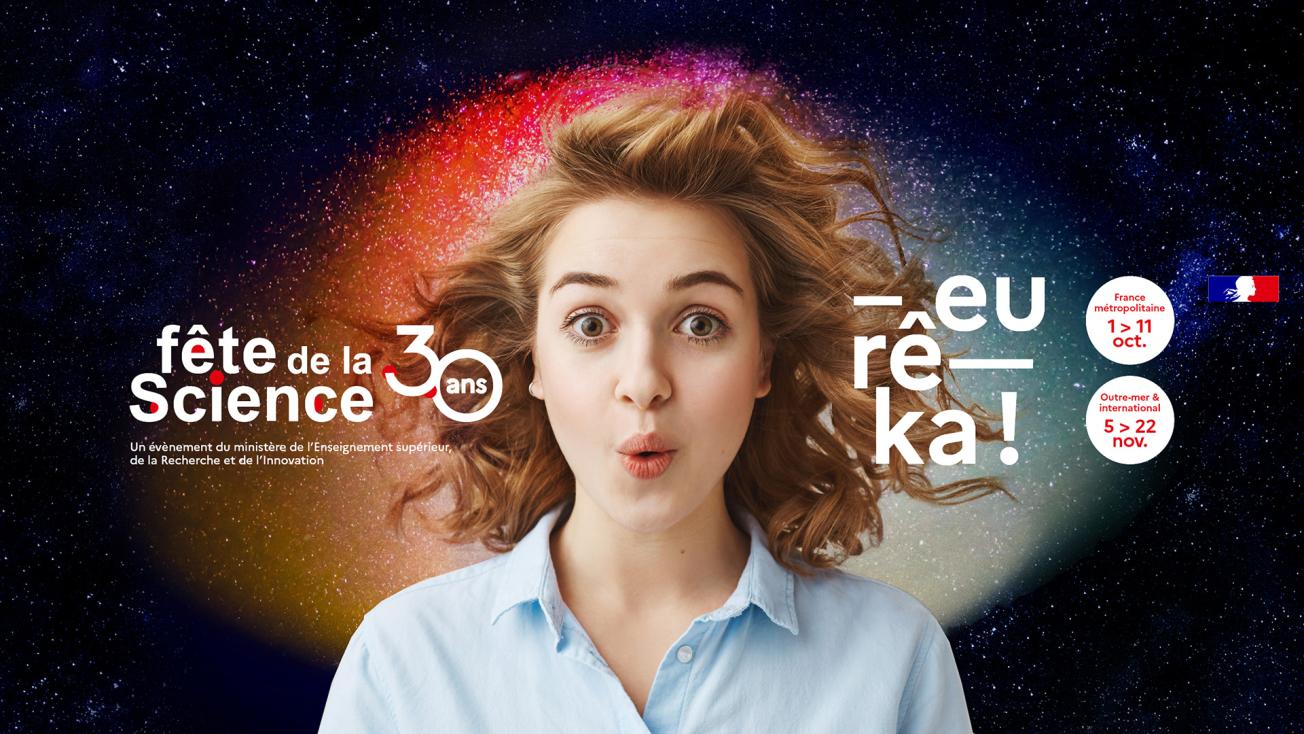
In 2021, the Festival of Science celebrates its 30th anniversary with the theme "The thrill of discovery".
© Fête de la science
The 2021 Science Festival will provide an opportunity to celebrate the 30th anniversary of this popular event, which aims to introduce science to the broadest possible audience.
The 2021 Science Festival will be held:
- From 1 to 11 October 2021 across France, in the following regions: Hauts-de-France, Normandy, Brittany, Pays-de-la-Loire, Centre Val de Loire, Nouvelle Aquitaine, Occitanie, Sud-Provence-Alpes-Côte d'Azur, Auvergne-Rhône-Alpes, Bourgogne-Franche-Comté, Grand Est, Ile-de-France, as well as New Caledonia and French Polynesia.
- From 5 to 15 November 2021 in Corsica and French Overseas Territories: Guadeloupe, Martinique, La Réunion, Mayotte, French Guiana.
2021 Festival of Science: meet our ambassador!
Transcription
EUREKA! DISCOVERY AND WONDER BRGM
hosts the Science Festival October 9th and 10th, 2021
Meet Our Ambassador
Hello, I'm Caroline Prognon, I've been a BRGM geologist for 15 years. My area of expertise is near-surface formations. I look at what's under our feet at depths of 0 to 100 m, what's known as the Earth's skin.
Geologists… Do they just look at rocks all day?
I wish, but no, I don't look at rocks all day. When I'm out in the field on specific projects, then yes. I bring samples back to my office to analyse and observe them, then part of my work is also on the computer to build maps or geological models to be used for risk management, water management, and any number of other applications.
Are you proud to be the Science Festival's ambassador?
Yes, I'm proud to be the voice of science, all the sciences for that matter. At BRGM, we do geology and so much more. We do mathematics, physics, chemistry. Combining all these fields is exciting and that's the message I want to communicate as ambassador.
Is it easy to make science understandable?
Not all the time, it can be very difficult especially when you're highly specialised in a field. You're used to going into detail and explaining using a technical vocabulary. It's rather difficult but also very fulfilling. It helps you get a different perspective on things. Sometimes when kids ask questions, it forces you to really think about what you do and how you talk about it. They ask if there are lakes of lava beneath our feet. That's how they understand it, and you have to explain the reality in simple terms.
How is BRGM involved in the Science Festival?
BRGM is involved across France, Overseas Territories and regions included. Then every four years, we host the festival at our site in Orléans.
How do you experience the wonder of discovery?
There are two separate things there, discovery and wonder. Discovering new things is common in this line of work. Discovering all the time, sometimes small things. I feel a little bit like a detective on a treasure hunt looking for clues and specific minerals in rocks as well as fossils that may change my approach entirely. There are lots of emotions involved. There's doubt, joy, worry at times. Sometimes things don't turn out at all like I foresaw them. But that's fine, back to the drawing board. Those emotions are important. I think of one experience I had. I originally started doing geology because I was interested in volcanology. When I was little, I loved volcanos and read everything about them. My dream was to see an active volcano. I finally did three years ago on assignment. I went to Réunion and at night I saw a volcanic eruption, lava, etc. That was just incredible! It was an unbelievable sight to me and very moving. I felt so joyful and also surprised because it was greater than I imagined.
SCIENCE FESTIVAL 30th Edition
To find out more

Science live (Science en direct), online from 1 to 10 October 2021
“Science live” will take place every day from 1 to 10 October, from 5.30 to 7.30 pm on the “L’esprit sorcier” (wizard’s spirit) YouTube channel and the Facebook page and the Fête de la science website.
10 programmes, every day from 5.30 to 7.30 pm
In all, there will be a choice of 10 thematic programmes, live, hosted by Fred Courant and the journalists of the Esprit Sorcier TV programme. They will feature prominent researchers from the largest French research institutions and organisations.
Every day, all internet users, young and old, will be able to participate and test their scientific knowledge in a 45-minute interactive “Grand Quiz”, carried out live from an emblematic venue of the Fête de la science in the region.
In the second part of the programme, researchers, in duplexed sessions from their laboratories or sometimes on the other side of the world, will present the latest scientific innovations in all fields of research. They will also give us their “very personal” testimonies and share the emotions they have felt as researchers.
In partnership with CASDEN and EDF, the daily newspaper will also be distributed in partner institutions and research organisations: ANR, BRGM, CEA, CNES, CNRS, Ifpen, Ifremer, IGN, INED, Inrae, Inria, Inserm, IRD, IRSN.
BRGM scientists will speak during several programmes:
Friday 1 October: TV programme “Are you interested in switching to different energies?”
Sunday 3 October: TV programme “Natural resources: solutions for the future!”
Sunday 10 october: TV programme “Exploring the past and understanding the present!”
Monday 11 october: TV programme “Anthropocene: a small footprint for a human, a big one for humankind”
To find out more

BRGM open house in Orléans, 9 and 10 October 2021
Each year the Science Village sets up at some significant venue in the Loiret and this year it is BRGM's turn to open its doors to you on 9 and 10 October. More than 30 laboratories will present their work.
There will be numerous activities and conferences as well as an adventure course for children.
Adventure course in the BRGM Scientific Centre
For children
- Become a gold prospector.
- Solve all the questions in our quiz by visiting each of the different displays.
- And earn gold coins!
Visit to BRGM laboratories
Environmental Test Centre
- Visit the facilities for experiments on polluted soils and the treatment of minerals.
- Learn about environmental monitoring methods and recycling processes.
- Understand oil clean-up techniques with our decontamination model.
Analysis - Metrology
- Visit the laboratories and discover the scanning electron microscope, spectrometers, etc.
- Use very thin slides to look at rocks under the microscope.
- Learn about chemistry through various tests.
- Discover the work of laboratories through our serious game.
Mineral resources
- Visit the geotheque - carothèque (core samples collection), a unique heritage space dedicated to the subsurface.
- Look for fossils and have your picture taken with the dinosaurs.
- Learn about geology with our board game.
- Discover what geologists do.
- The explorers’ camp will present the equipment that field geologists use.
- You can also take part in a gold panning workshop to search for gold specks in sand and observe metals and minerals under a microscope.
- Visit the metal, mineral and fossil samples exhibition.
- Try the augmented reality sandbox to understand how landscapes evolve.
- Take part in the volcano workshop for children and see samples of volcanic rocks.
- For the little ones: understand geology using plasticine.
Post-mining
- Discover the exhibitions on mining and post-mining in France (panels, films, ores, miner’s equipment, etc.).
- Step into the shoes of a miner and keep your souvenir photo.
- Take part in the mine board game for children.
Natural hazards and climate change
- Understand the phenomena linked to climate change: seismic risks, coastal risks, landslides, etc.
- For children: discover the mechanisms behind climate change through fun experiments (submersion, erosion, etc.).
- Take part in the earthquake workshop for children with a model and Kapla construction planks to understand how an earthquake works.
- Find out how scientists map the subsurface using geophysical measurements.
- Discover cavities as if you were in them, thanks to virtual reality.
- Attend a demonstration of 3D mapping of underground cavities and find out about the work done in the Orléans quarries.
- Visit our exhibitions on cavities in France and in the Orléans subsurface, and on the great earthquakes of the past.
- Discover our model on boulder falls.
- Watch a demonstration of a seismic sensor (a sensor that detects the shaking caused by earthquakes).
- Discover the exhibition on the new underwater volcano of Mayotte (see how the volcano was discovered, model, selection of rocks from the volcano, presentation of a seismometer).
Geothermal energy and CO2 storage
- Discover geothermal energy through an exhibition and models.
- Visit the experimental geothermal platform.
- Discover our model explaining how CO2 can be stored.
- Listen to the story about the carbon cycle. Saturday 11am, 3pm and 4.45pm. Sunday 10.30 am, 2.20 pm and 3.30 pm.
Water
- Find out how to measure the level of an aquifer using a piezometer.
- Test and compare the taste of different waters in our water bar.
- Understand the circulation and recharge mechanism of groundwater with our water model and various experiments (sandboxes explaining the principle of quicksand, etc.).
- Solve the riddles in our water quiz.
- And for the children, learn about the water cycle through a board game.
2021 Festival of Science, at the BRGM in Orléans
Talks
Will we run out of water tomorrow? Solutions for the controlled recharging of aquifers
Saturday 9 and Sunday 10 October
Animated talk by Géraldine Picot on Saturday at 2pm, 4pm and 5pm and on Sunday at 11am, 1.30pm, 4pm and 5.45pm.
Climate change: when the Earth goes wild!
Sunday 10 October - 3 pm
With François Gemenne (researcher at the Institute for Sustainable Development and International Relations, author of the Atlas of the Anthropocene), Hélène Bessières (hydrogeologist), Goneri Le Cozannet (specialist on coastlines and the risk of flooding), Olivier Cerdan (specialist on landslides and erosion) and Charles Fournier, vice-president of the Centre-Val de Loire region.
More than 60% of the French population is now exposed to climate-related hazards. How can we adapt? What solutions are there for preventing these phenomena, monitoring them or adapting to irreversible changes? How can regions become more resilient?
Science Village
A science village will host all the research organisations, associations, companies and other organisations in the Loiret.
More than 20 organisations will be participating: Centre National de la Recherche Scientifique (CNRS), Institut National de Recherche pour l'Agriculture, l'Alimentation et l'Environnement (INRAE), Institut National de Recherches Archéologiques Préventives (Inrap), Observatoire des Sciences de l'Univers en région Centre (OSUC) and the University of Orléans, CHRO, Groupe de Recherches sur l'Energétique des Milieux Ionisés (GREMI), Institut de Chimie Organique et Analytique (ICOA), Interfaces, Confinement, Matériaux et Nanostructures (ICMN), Immunologie et Neurogénétique Expérimentales et Moléculaires (INEM), Institut des Sciences de la Terre d'Orléans (ISTO), Laboratoire de Biologie des Ligneux et des Grandes Cultures (LBLGC), Laboratoire de Physique et Chimie de l'Environnement et de l'Espace (LPC2E), Polytech Orléans, Aesco, Astrocentre Orléans, Atelier des sciences - IG45, CEN Centre-Val de Loire, CNPE de Saint-Laurent, Cosmétosciences, Geosource Orléans, Les petits débrouillards Centre-Val de Loire, Licence Médiation des sciences et éducation à l'environnement (IUT de Tours), Orléans zéro plastique, Space Tech.
Scientists will share their passion and penchant for science with you through activities, exhibitions, café-debates, walks and other surprises throughout the weekend. Events:
How does our brain work?
Photo exhibition "The QR code of neuroscience". Discover how the brain works with mystery photos and animated exhibits.
What are the consequences of pollution and infections on the lungs?
What is the latest research on this topic?
Helping children understand certain mechanisms
How do you create electricity with a battery? Why do seasons happen? How does a water tower work? What is it for?
Functional carbons for removing pollutants and detecting micropollutants
Carbonaceous materials are integrated into devices for the removal of pollutants or their detection via electrochemical sensors.
Chemical games
Nature is a giant Lego game in which the building blocks are atoms and from which we can produce anything from new medicines to cosmetics.
The secrets of cosmetics
If you think cosmetics are only for women, this workshop will prove you wrong.
Discovering Mars
What does the planet look like? What were the main stages of its exploration? Humankind has always dreamt about Mars since it is both our closest neighbour and yet so difficult to reach. Sun observation will be possible depending on the weather.
Cabinet of naturalist curiosities
Many things can be found during a walk in nature: feathers, droppings, tracks and traces, leaves, etc. Alone or with others, will you be able to recognize them? Only on Sunday 10 October.
Discovering soils and their functions
What are soils made of? What is the infiltration rate of water in different types of soil? Young and old will be invited to take part in experiments and simple manipulations.
Let’s play maths with the game Awale
Plasmas: an infinite number of applications for our everyday lives
Plasmas are amazing gaseous environments that exist in their natural state (stars, comets, lightning or the aurora borealis) or are artificially created. They are all around us! Learn about this fourth state of matter which is particularly fascinating!
Escape game: chemical incident
Fatal mistake, you have just made the wrong product! It spreads through the air. The alarm goes off, the doors lock. You will have fifty minutes to find the key that will allow you to leave the room. Can you get out of the laboratory before you suffocate?
Amazing science
Discovery is exhilarating but also involves testing, experimenting and being challenged by original experiments. Come and test the physics of sand, the movement of a pendulum and the behaviour of materials, or observe the mathematical structures of nature.
Deep in the Earth
Our planet is full of surprises, from volcanoes and their magma to mountain ranges and their faults, but also seismic risks. The scientists will take you deep into the bowels of the Earth with their amazing models.
Educational clean-up walk (waste collection)
A citizen’s group, “Orléans zero plastic” will be organising a clean-up walk around the Science Village (between 10.30 am and 1 pm), followed by an educational event to identify the types of plastic and their impact on the environment. Only on Saturday 9 October.
Air- and water-propelled rockets
Using an empty bottle, cardboard and the kind of tools you can find at home, come and build your own air and water rocket. The workshop will be held outdoors. After this construction, the rocket will be launched, capable of reaching a height of over 30 m. A computer simulation programme will be on hand to predict the rocket's trajectory and range. Each participant will receive a cardboard certificate with a photo of the participant and another of the rocket launch.
And also
Science Cinema
Continuous screening in the auditorium in between conferences.
Bike tour, Sunday 10 October in the morning
Crossing the BRGM premises is one of the stages of the Vélotour this year. The first of its kind. 5000 cyclists have registered for the Vélotour. The cycle route will pass by the Geotheque, then through the Time Alley exhibition, which presents the main dates in the evolution of the Earth and life. It will leave via the experimental platforms PRIME, Plat'Inn and the Geothermal platform.

France's Science Festival in the Regions
Grand Est (Eastern France)
Uckange
On Sunday 10 October 2021, from 2 to 6.30 pm, BRGM will have a stand in the Village des Sciences in the historic park of the U4 blast furnace in Uckange (a former steelworks site in Moselle). The science-learning event will consist of a life-size board game (with the children as the pawns) on the theme of groundwater, and the screening of short videos on the different themes of earth sciences: groundwater, mineral resources, natural hazards, geothermal energy, etc.
Reims
The Fête de la science will take place on 2 and 3 October at the Planetarium de Reims (Address: 49 avenue du General de Gaulle, 51100 Reims). The stand will be on the theme of water: presentation of a quiz on water, a selection of films on water, simple experiments to understand the groundwater cycle.

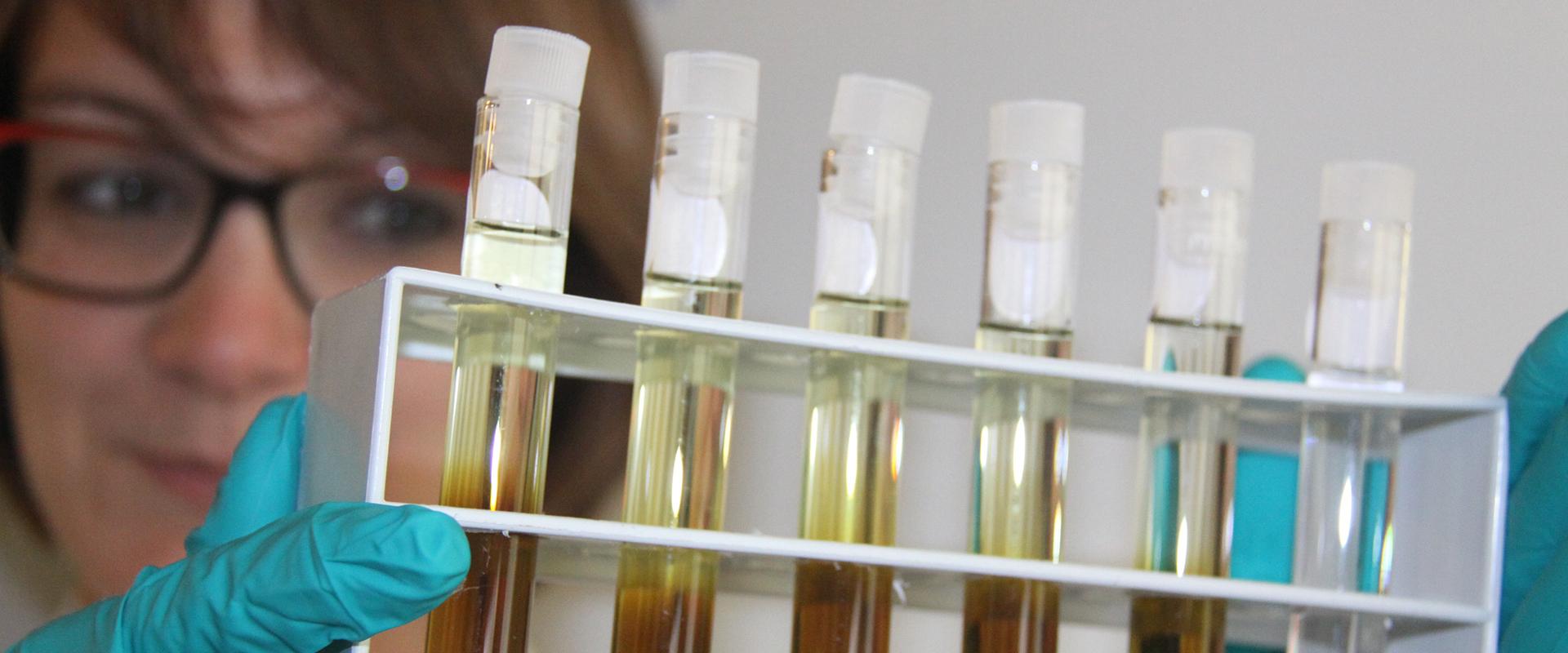
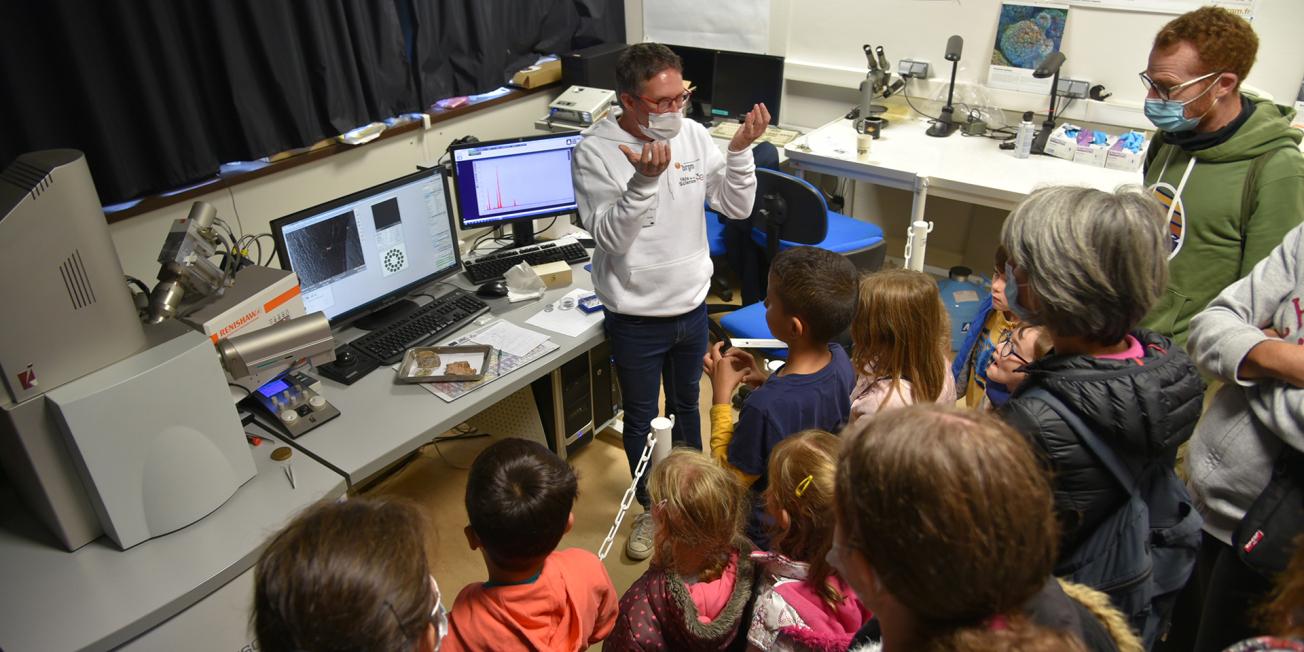
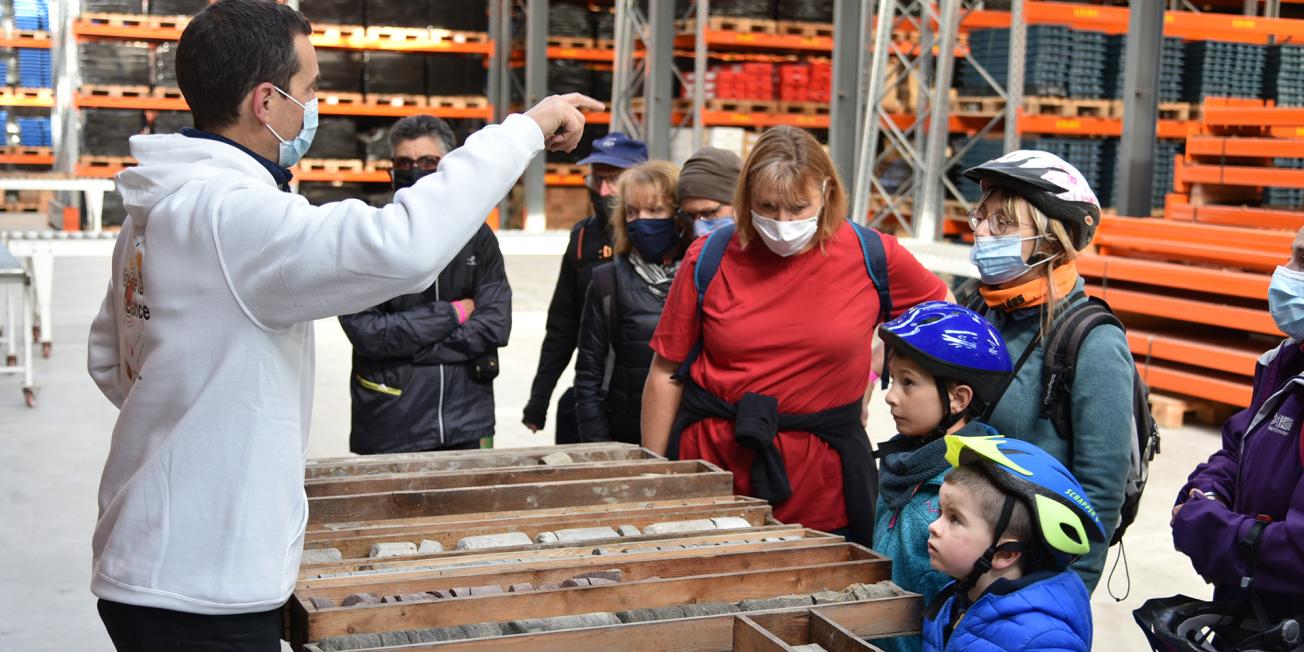
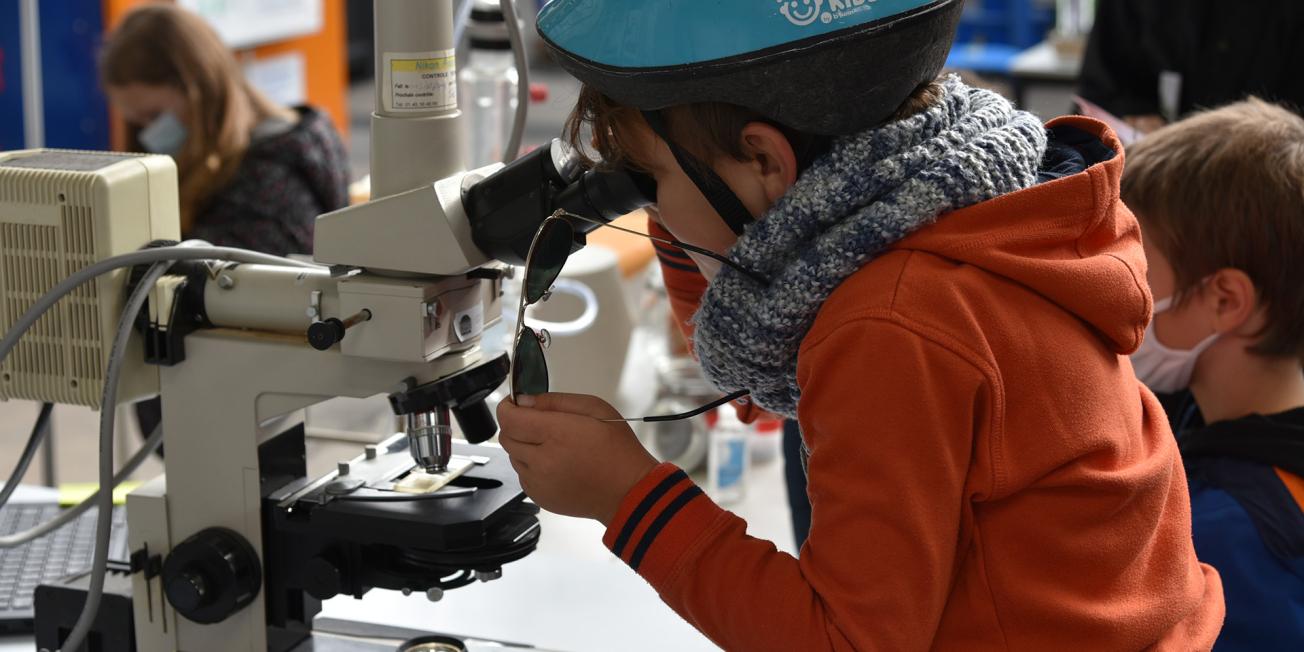
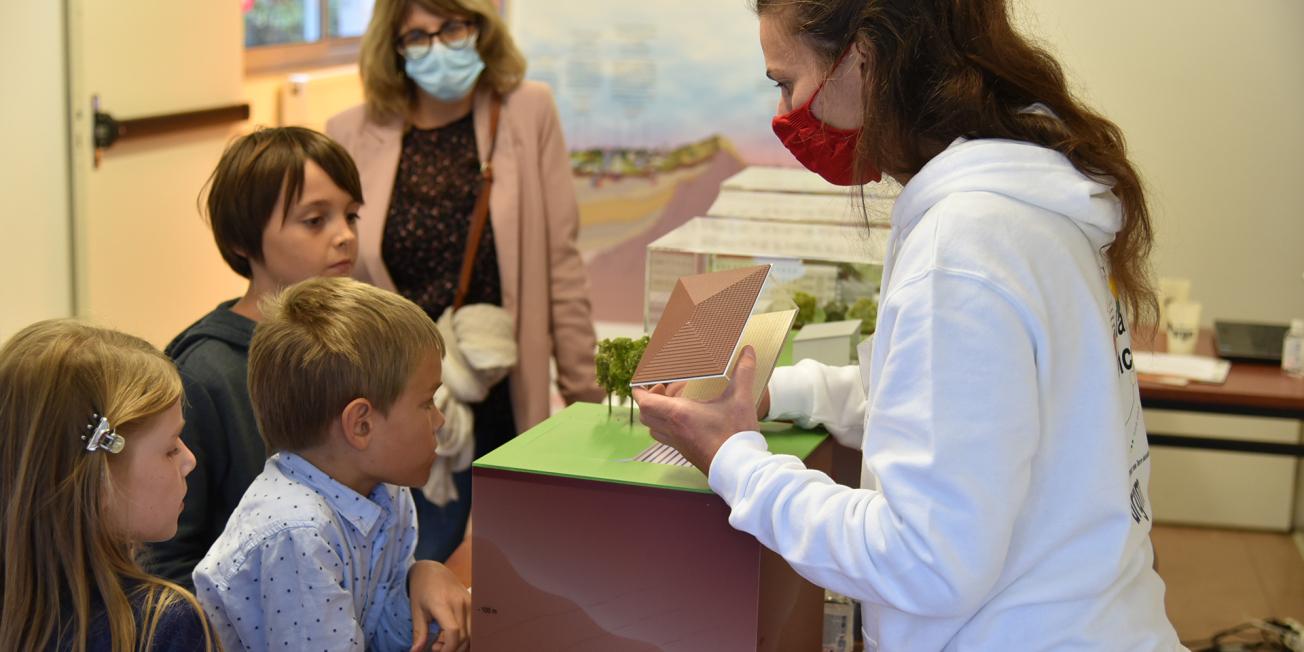
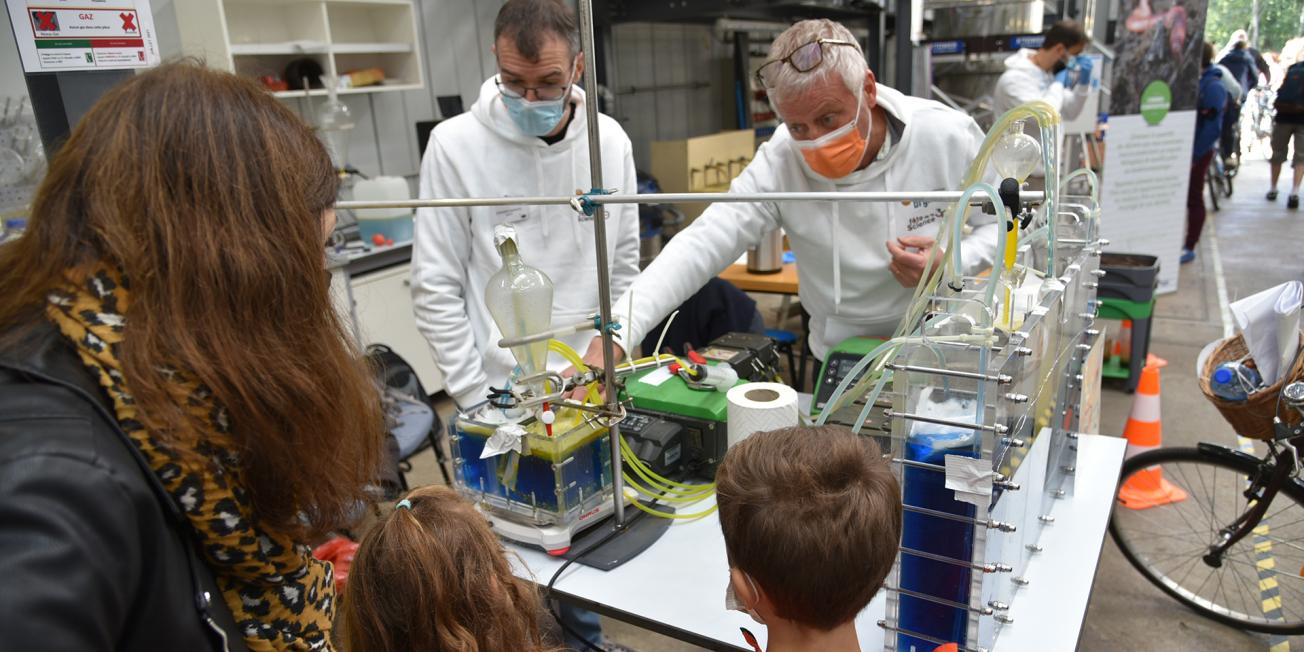
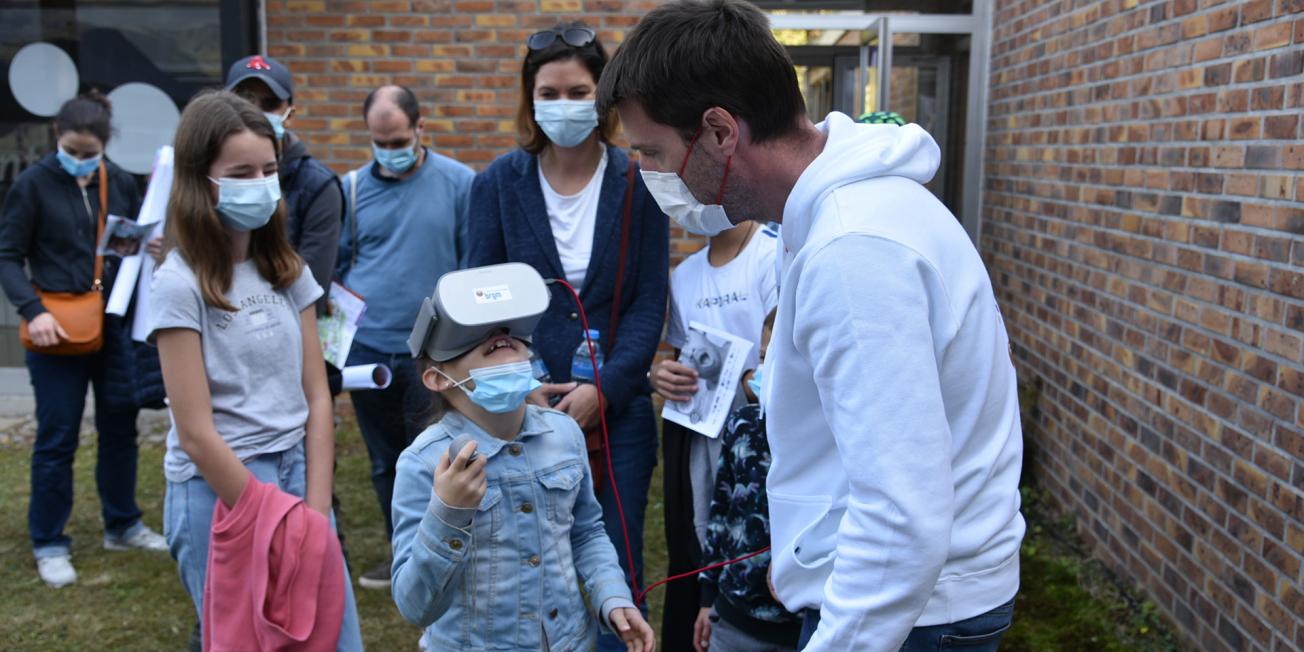
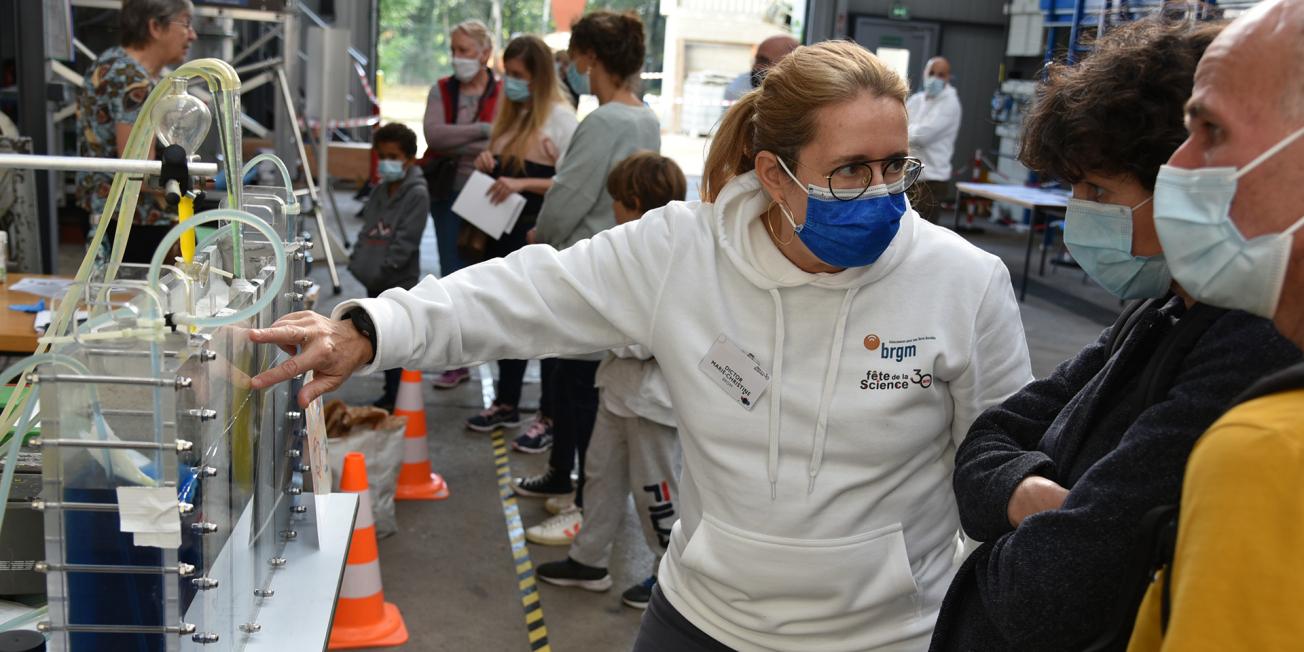
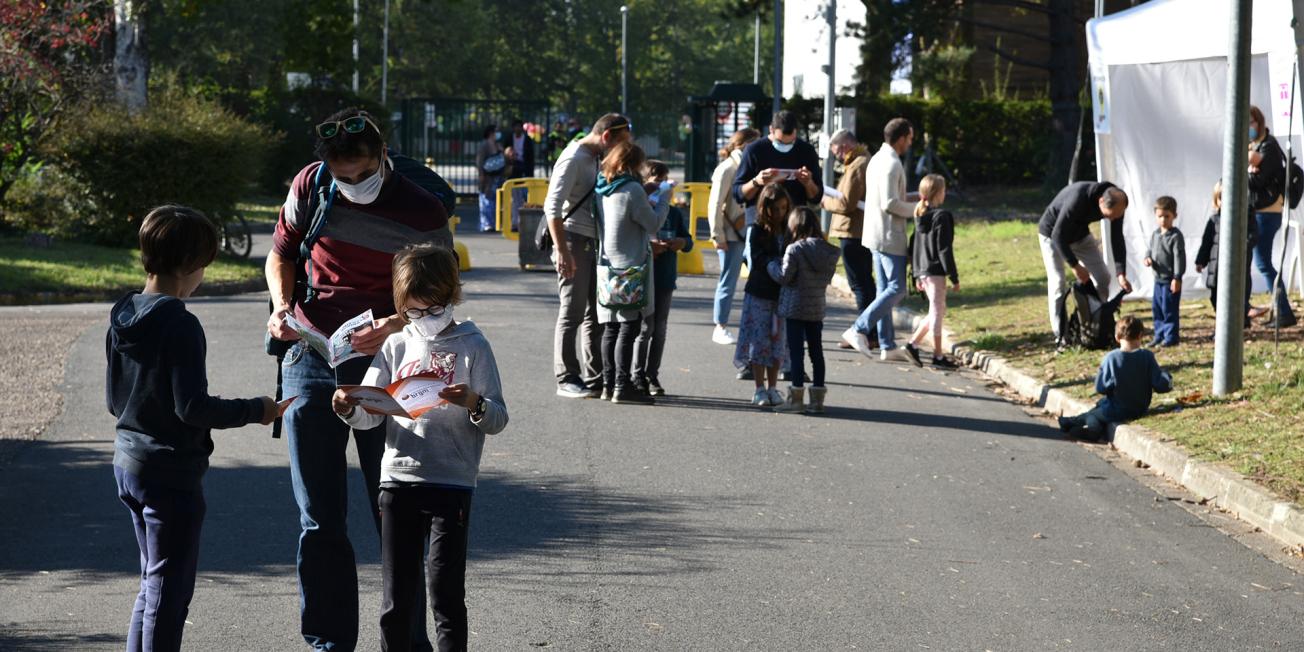
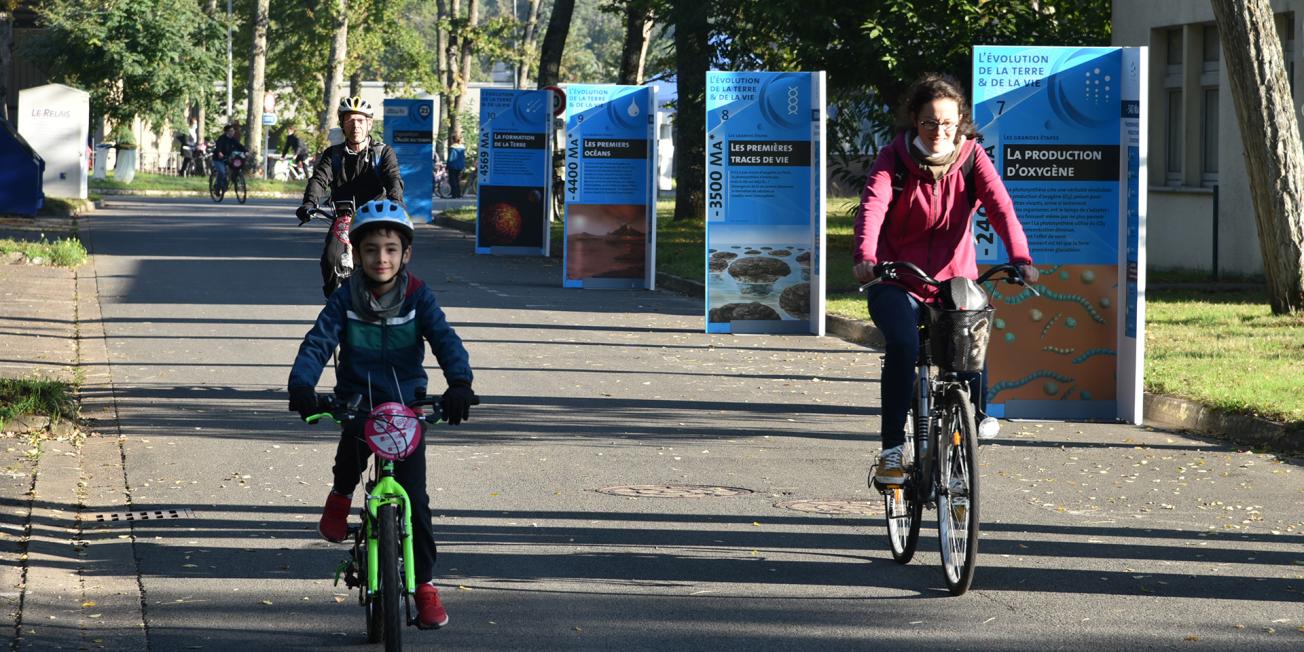
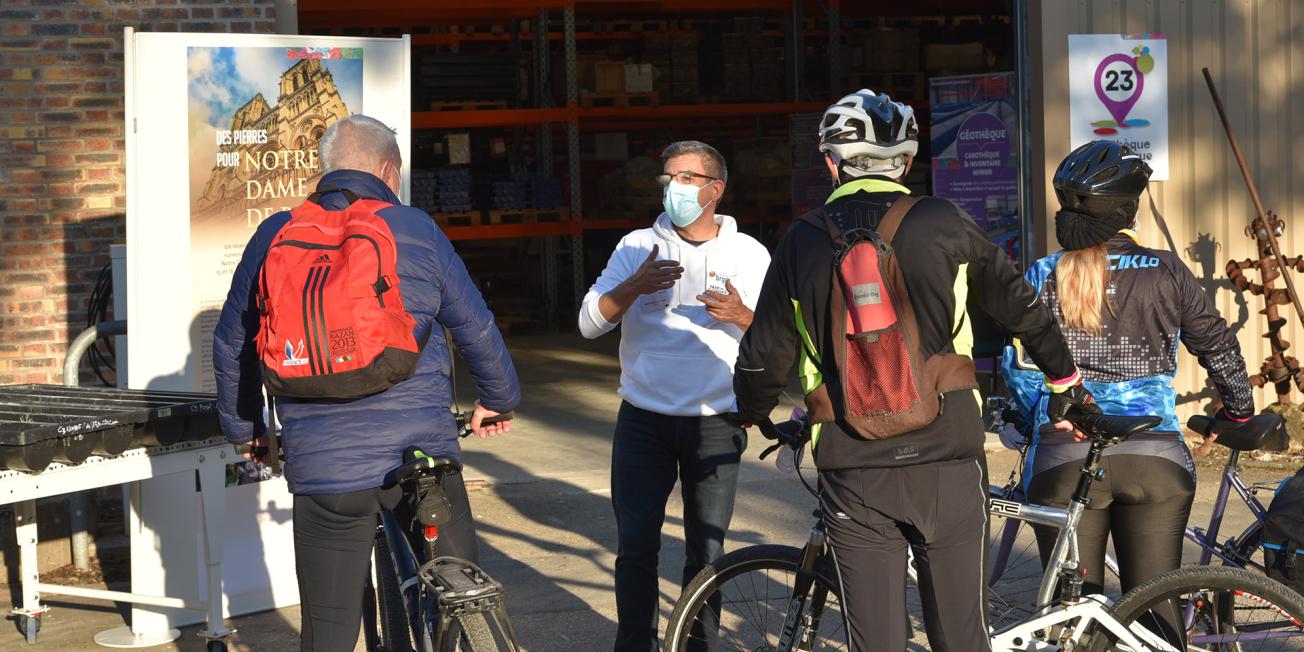
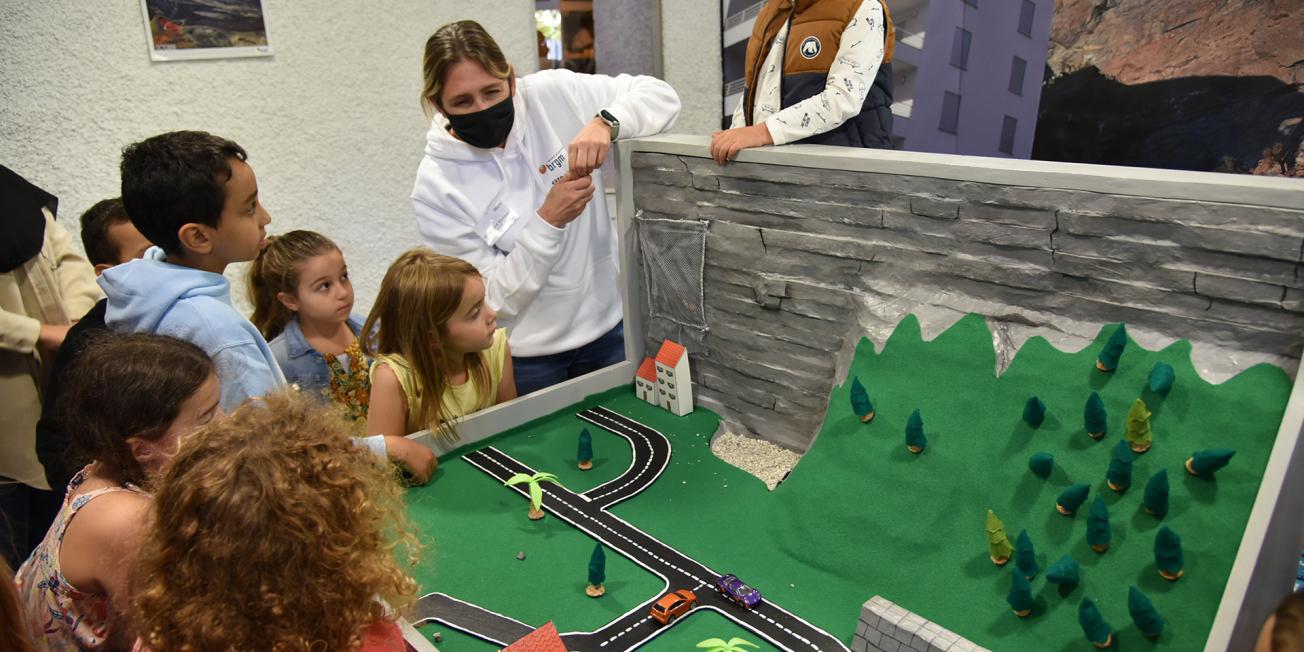
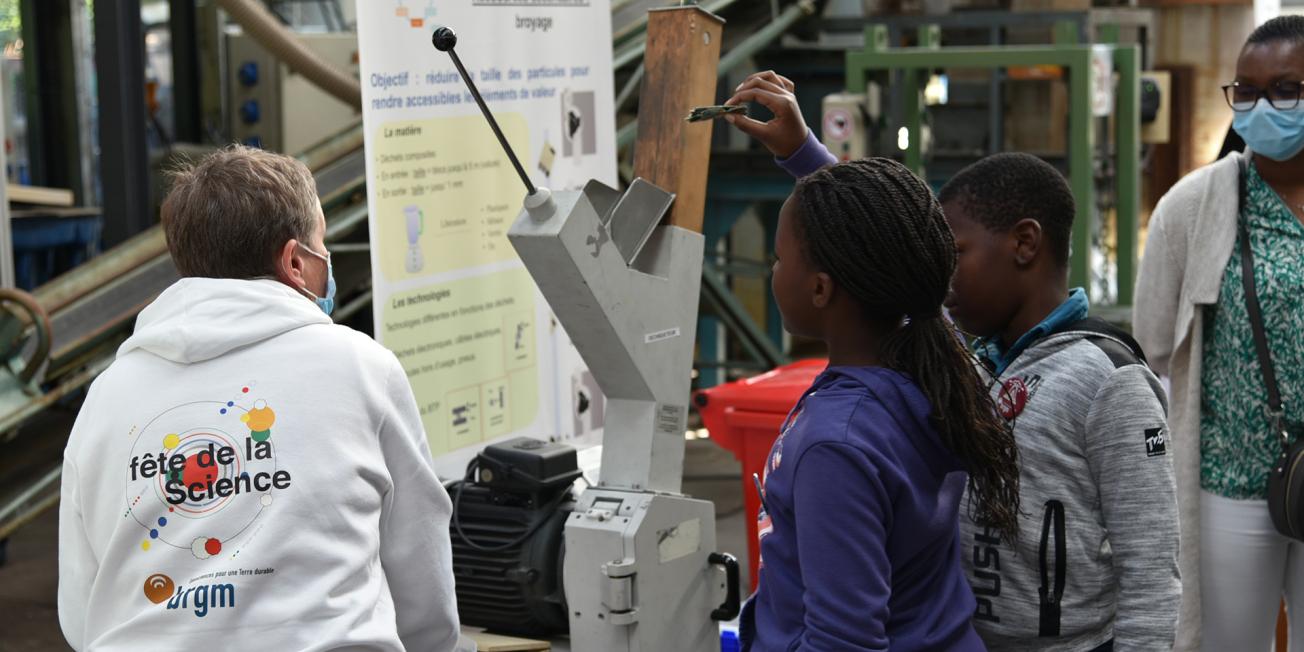
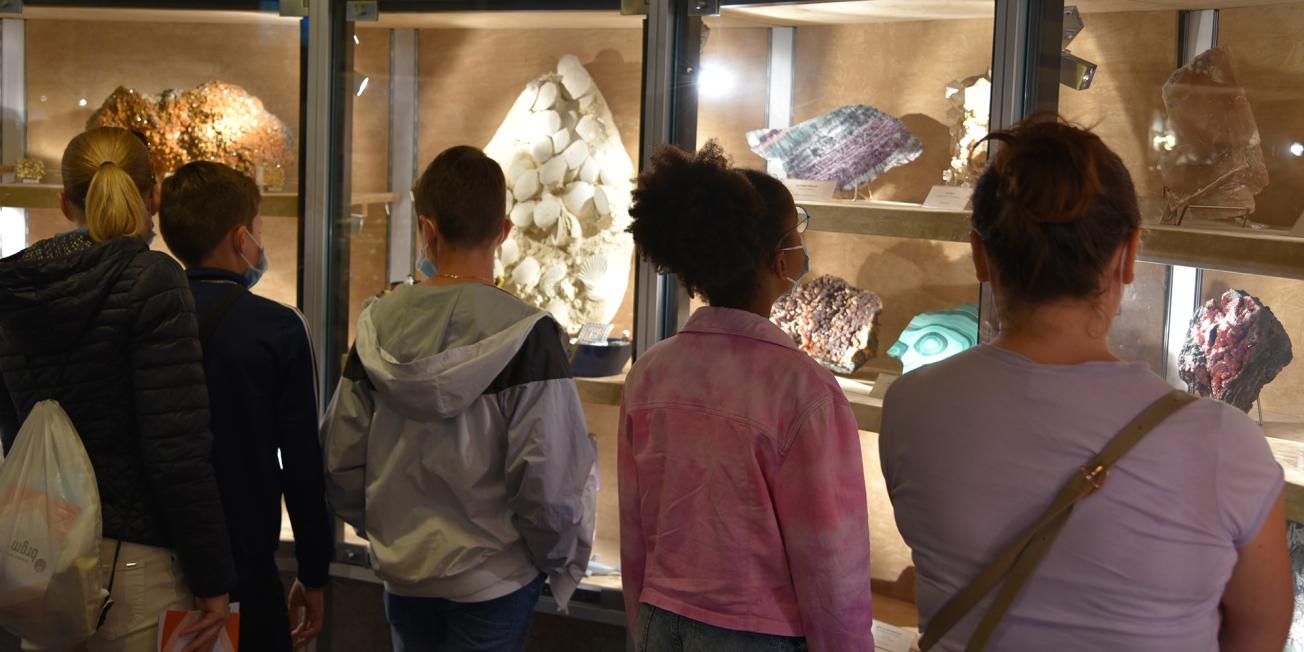
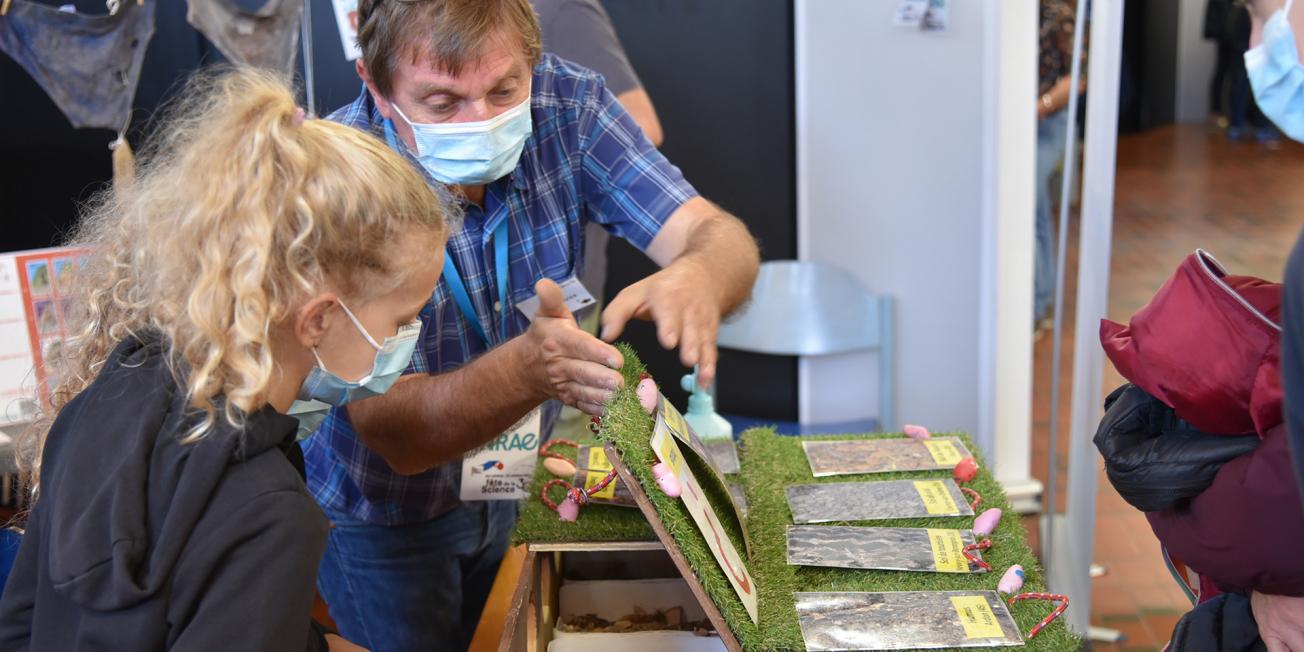
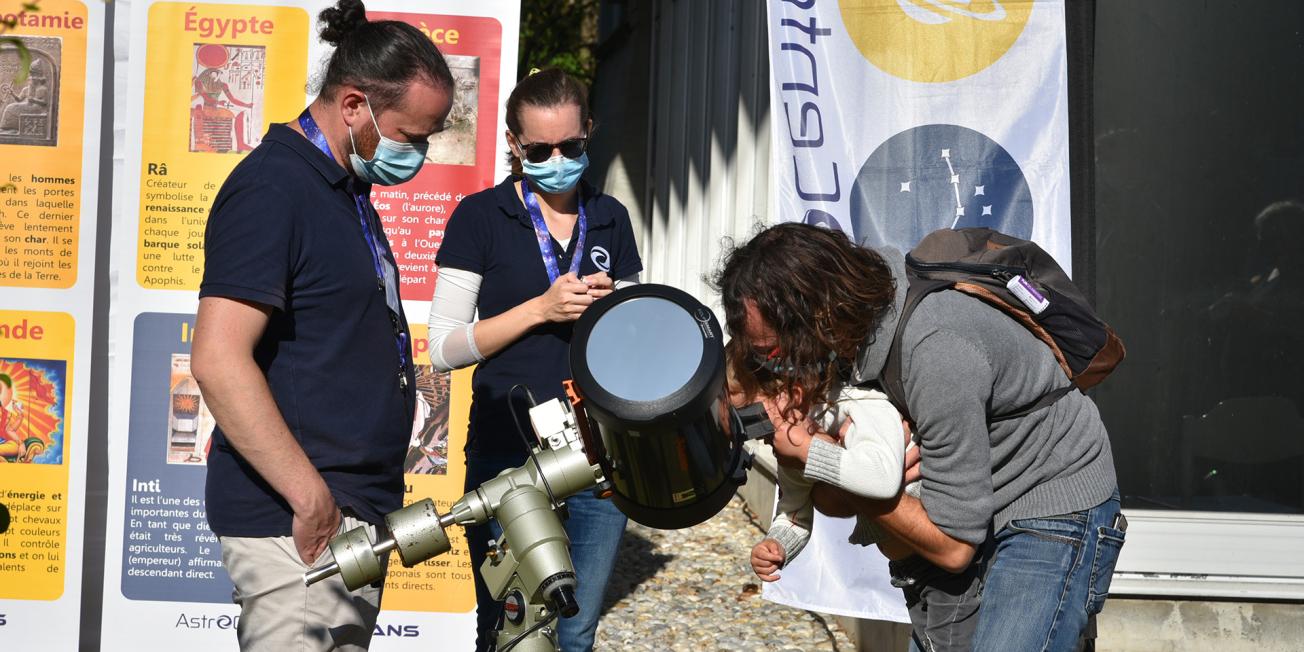
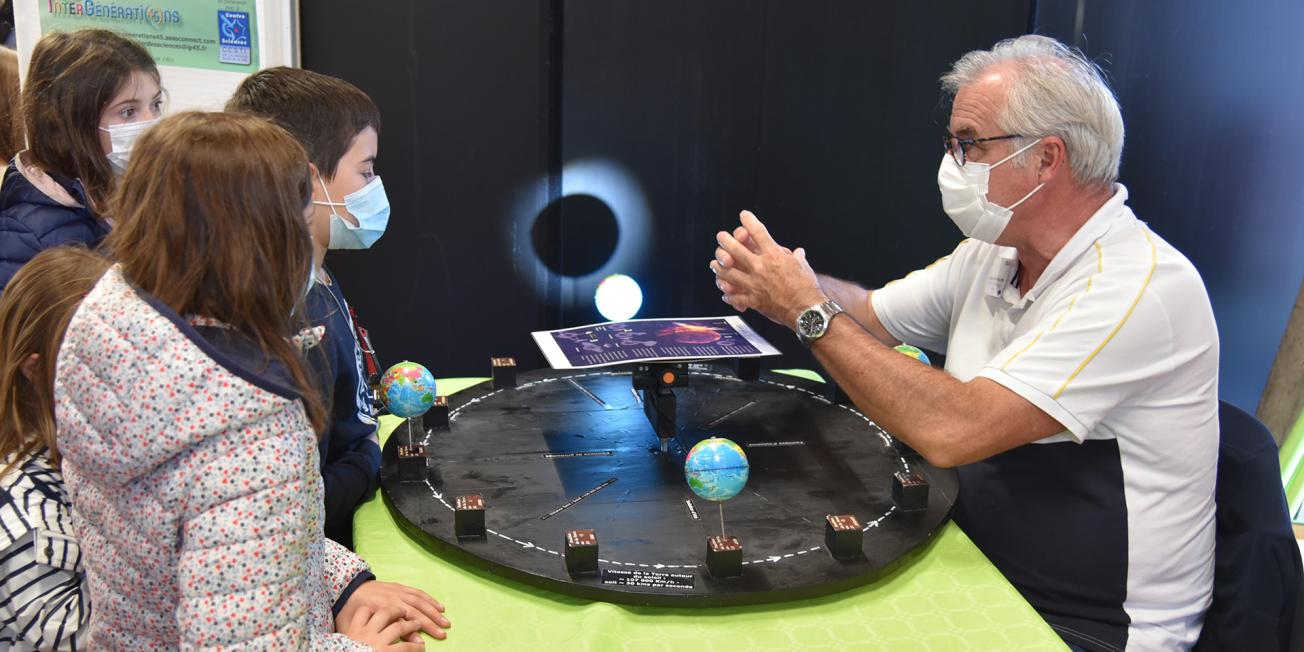
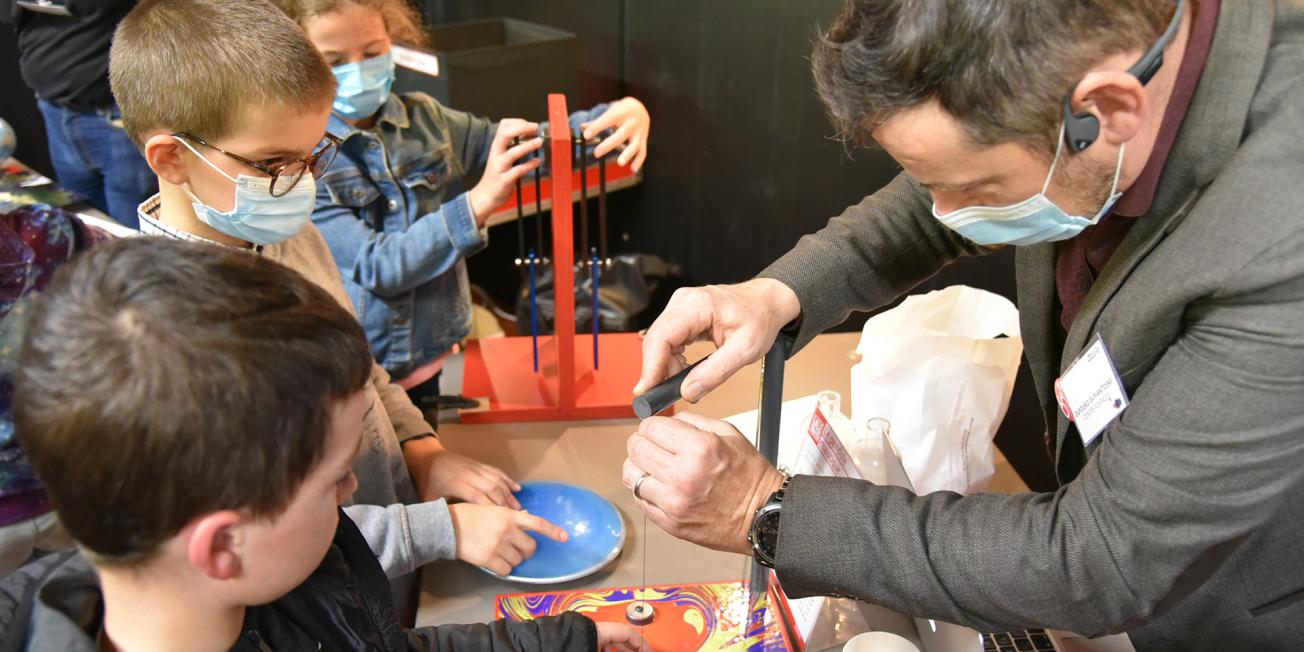
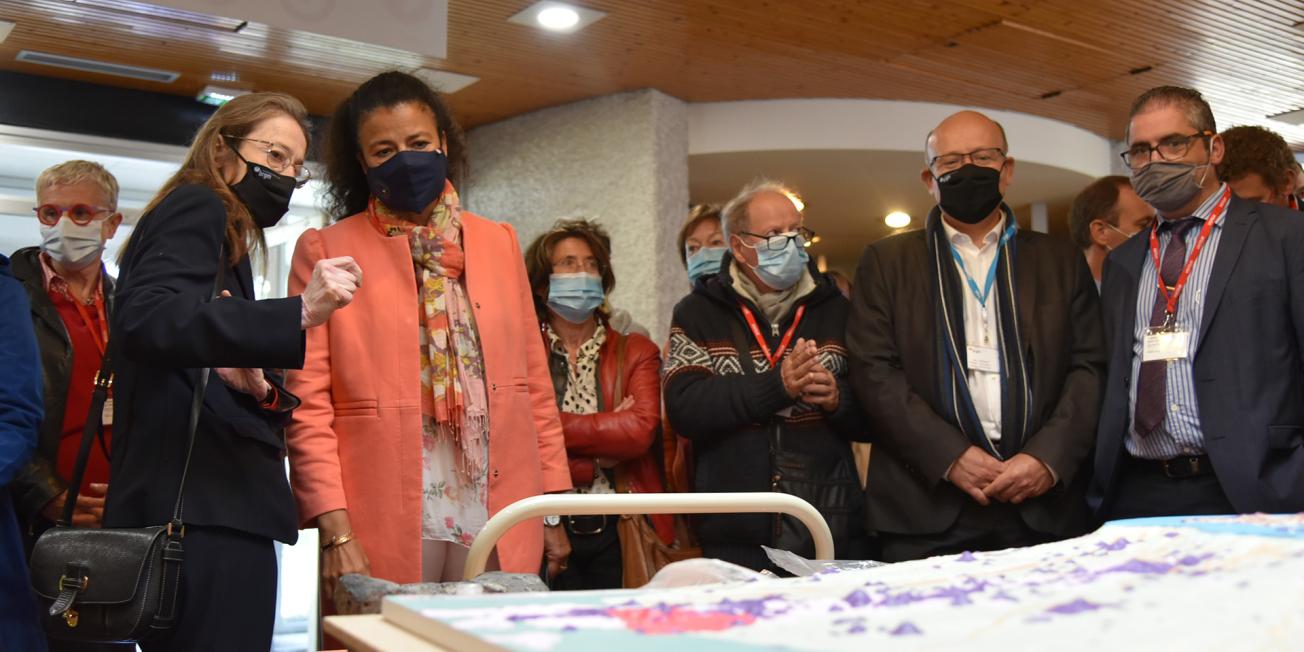
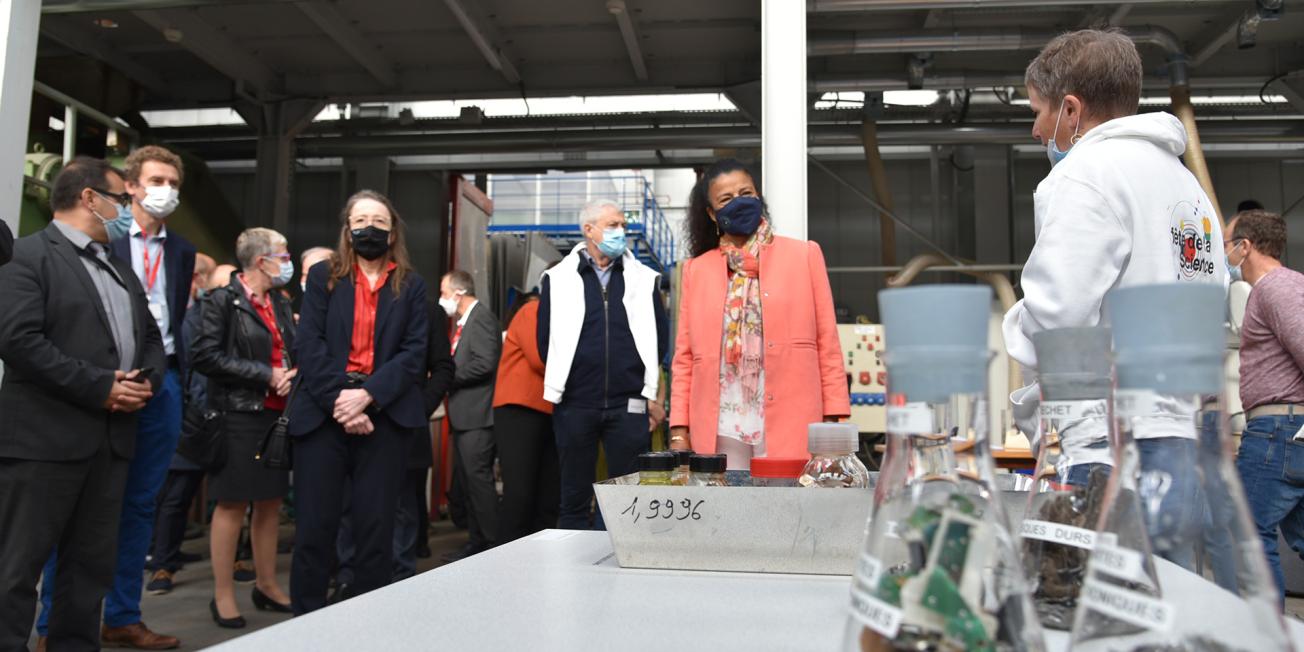
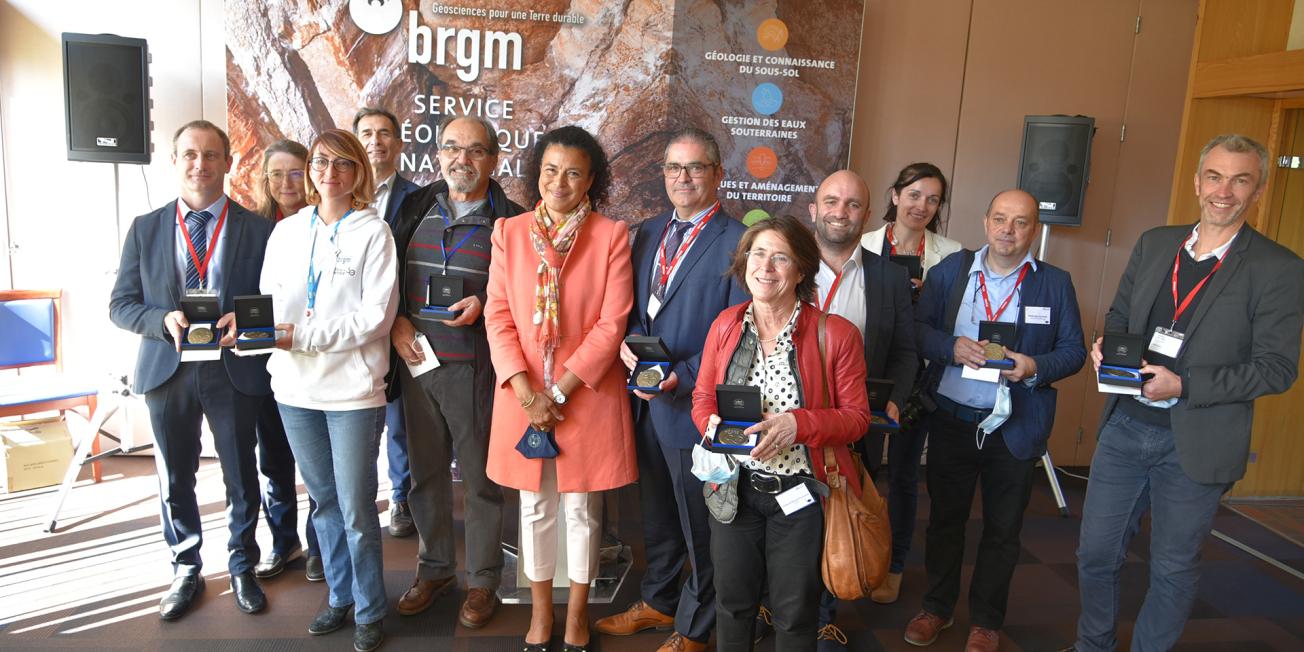
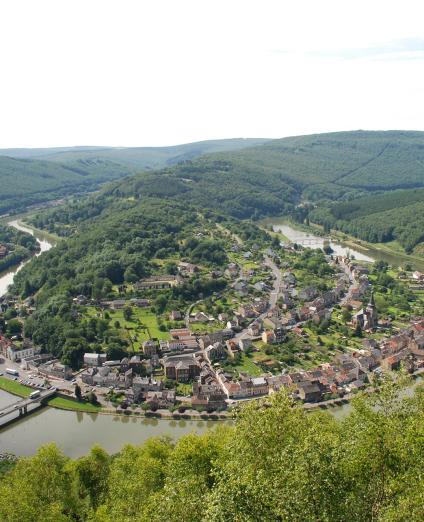
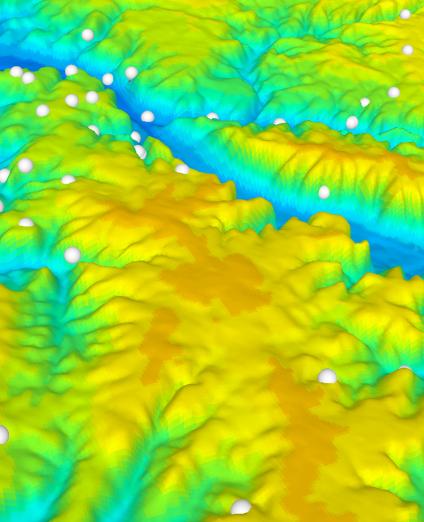
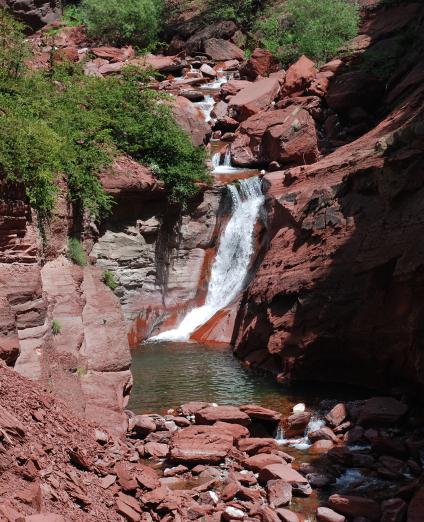
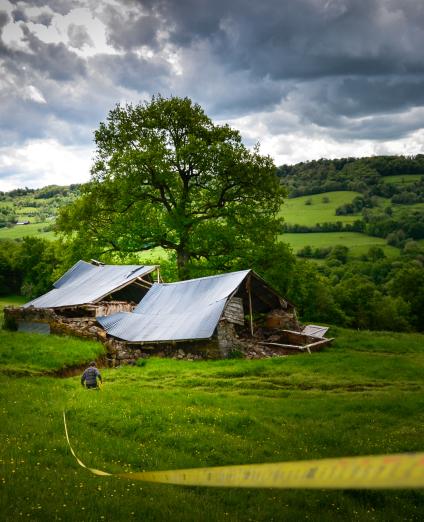
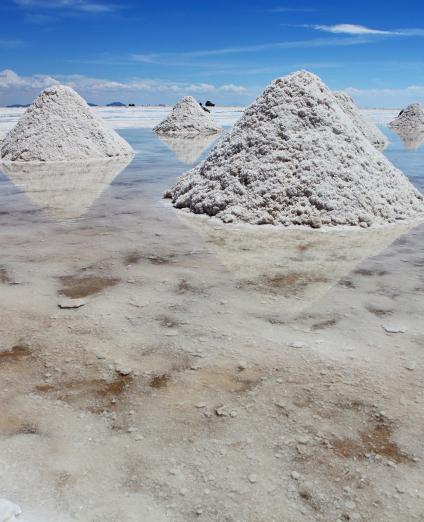
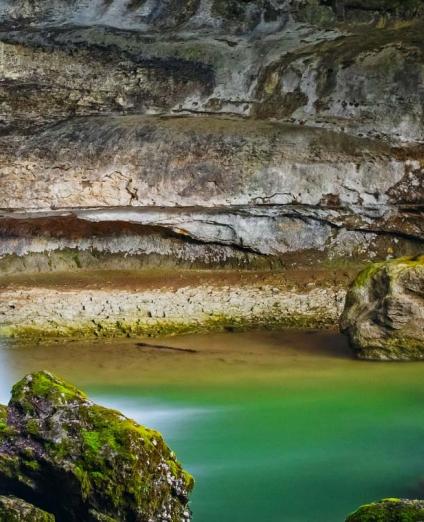
Mariane Peter-Borie, geologist, head of the DEEPEGS project, a geothermal energy and storage unit, talks about the potential of geothermal energy, particularly deep geothermal energy, for the energy transition. In particular, she presents the deep drilling project she coordinated under extreme conditions in Iceland, where the temperature reaches 600°C at a depth of 4,600 metres, and its potential (drilling in a super-hot reservoir can produce at least ten times more energy than a current exploitation well in a volcanic context).